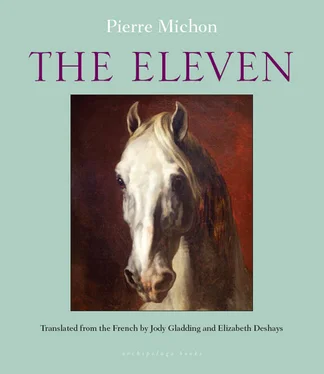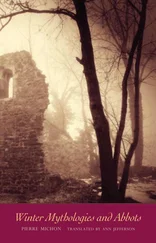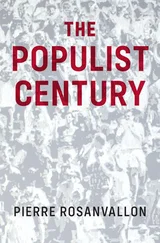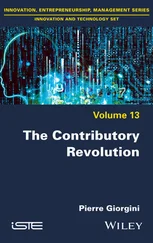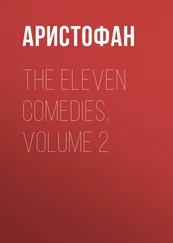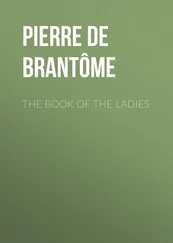Françoizélie!
That is what they called him, and that is what they are calling him as they rush down the little steps. They are still rich, all the old man’s money has not yet been sunk into unfortunate literary toil, the poetic dabbling of François Corentin de la Marche, their boats come and go and their vineyards bear fruit; and that must be seen; so they have great basket skirts and perhaps even — the young one at least, Suzanne — one of those fine silk dresses that were called criardes because of the rustling noise they made when a pair of legs was uncrossed beneath them: a criarde the color of gold, that spread out behind him, melted over him, called him its treasure, while through the gladioli, the open roses, he ran full tilt through the garden toward the canal. The heart of summer, happiness: two frightened hearts in silk skirts circling around you in a ballet as regulated as celestial mechanics, imploring you not to go far from them. And perhaps it is there, in July, with the cries of women and the gladioli, that I can arrange the setting for one of those anecdotes that we all know, that are found in all the biographies written on Corentin, the light ones and the serious ones, in the spreads dashed off for the Louvre as well as in scholarly studies, and that could equally be found for that handful of painters who have been selected, who knows why, by the throngs, who have leapt into legend while the others have remained on the sidelines, simply painters — and who are, those few, more than painters, Giotto, Leonardo, Rembrandt, Corentin, Goya, Vincent van Gogh: they appear more than painters, they are more than they were. Thus perhaps it is on that day that the child racing down the garden slope clears the boxwoods, crosses the towpath at full speed, and his momentum carries him to the top of the levee where he stops short, because below is the water — should be the water: but today, with all the lock gates lowered, all the locks unbolted, the canal is dry from Chécy to Saint-Jean. The water is gone, the water is dead. And in the mud of the canal, in the wet Loire sands, horses with carts and Limousin battalions with baskets on their backs transport mud to the shore: because they gradually become choked, the canals, the great expanses of calm water, they must be cleared from time to time. Above, under the July sun, there is the odor of teeming life and ripe carp, which is the odor of death.
The stopped child regards all that with much interest, the dark Limousins, the mud, the dark odor; he is hardly thinking anymore of alarming the two women he has at his disposal. The two women are joining him now, catching their breath, laughing and scolding a little, touching him; their silk rustles against him. If he looked at them, he would see that his mother, too, regards all that with much interest, eyes wide, nostrils flared to the dark odor: tall, beautiful, good and devoted, but without a man since the departure of the poet, her nostrils passionately open to the dark odor. Without looking at her, François-Élie asks what those men there are doing. “They are remaking what your grandfather made the first time,” says his mother. “They are making the canal.” Then the child, with great seriousness and annoyed at having to state the obvious:
“They are not making anything: they are working.”

You smile, Sir? You do not believe it? Yes, it is too beautiful to be true: the artist, yes, the creator — the one who wants to believe with all his might, and who comes to believe, that the act by which one has a hold over the world, the act worthy of this name, has as its foundation and principle pure intellection, magic in short, the magical will of one man, and is only incidentally mechanical, magically mechanical one might say, as in the act of Love. He believed in some way that his grandfather had made the canal as God makes the world or the king makes a decree, that is, that the old apostate had put the Mozartian cloak over his shoulders and ordered the canal from the Powers of the Night, without further effort or toil, with only the intoxication of his powerful will; under that cloak only the powerful will to make the canal, that is, a mirror ten leagues long, ten leagues of shimmering water where the boats and the clouds come and go; and that one fine morning the docile Powers of the Night, withdrawing from the east into the west as is their custom, had presented him with ten impeccable leagues of mirror, of satisfaction, of visible will visibly satisfied on the surface of the earth, from Montargis in the east to Orléans in the west. And maybe too, under cover of night, the Powers of the Night had dispatched for this task the spirits of the air, whom François-Élie might have imagined as those surveyor angels you see in paintings, mechanics clearly, with their great compasses, their levels, their T squares, and nevertheless magical, nocturnal, emerging in a rustling of wings; but whom he never imagined in daytime taking this bizarre form of Limousins bent under their baskets. In daytime he discovered the Limousin substrata of the calm waters; that the calm waters are made with Limousins; he discovered them with no great pleasure — or displeasure either, because hardly had he discovered them before he decreed that they did not exist, that in any case they were such contingent beings it was as if they did not exist: as muscles no longer exist, their efforts, their tension, their torsion, their acrobatics, and their Gehenna in the great magic of the act of Love. “They are making nothing, because they are working”: one could not more passionately believe oneself to be unique and the world magic, magically the plaything of a single will, no? One could not believe more strongly that to act and to take one’s pleasure are one and the same thing. One could not be more of an artist, you could say, as the visitors say, attentively reading this childhood remark in the biographical note in the antechamber at the Louvre. Nor could one better illustrate that the individual man is a monster, as Sade and Robespierre said in their different ways. With great simplicity François-Élie was that monster: his monstrous belief gave him pleasure at being in the world and vigor in that world; with that belief and to maintain it, to nurture it, so that it continue to exist (and by the same stroke, that Corentin himself exist), he made the work that we know. The belief became doubt along the way, but it persisted: it is what kept him standing all his life, what both held him back and pushed him on in his smallest acts, and what finally he pulverized in The Eleven — unless once more he had tricked it, had cajoled it while renouncing it, or had renounced it in order to restore it, and had secretly reinstated it, unrecognizable.
Françoizélie !
How I would love to really see him and silently absorb myself in what I see, rather than droning on to you with my vague theories. I myself am more boring than all those notes in the antechamber at the Louvre. How I would love to see him there — to see all three of them (as at this moment we are seeing The Eleven ), him and the women stopped on the levee, from a little below, as if I were a Limousin below, under a basket of mud, in the mud of the Loire up to my thighs, toiling darkly under the July sun; as a Limousin would look at a painting, assuming Limousins and paintings ever came into contact. And it may be that we are that Limousin, you or me; it may be that a Limousin lifts his head and with his forearm wipes that mixture of sweat and the Loire running into his eyes; that between the foreman’s shouts he takes the time to look up to the blond apparition, the blond hair and blond skirts, the two women leaning over that child powerful as a cardinal-duke; and the little cardinal-duke points at this Limousin who is looking at him. Perhaps the Limousin takes note of that, he is used to it (this simple pointing, as at an animal in a zoo), but his eyes do not rest on François-Élie; this is a Limousin, after all; this is a man who has at his disposal no other duchess than the demijohns of doctored wine, no other vector for his strong will than the switchblades that spring miraculously from the demijohns into his hand, the day of the Lord: he has eyes only for the skirts. And perhaps he swears between his teeth that God is a dog, Diàu ei ùn tchi .
Читать дальше
